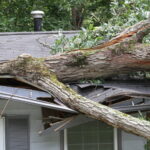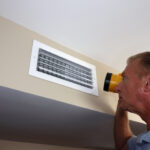One of the important steps to take before closing on a house is to get it professionally inspected. Despite potential objections due to the already high cost of buying a home, it’s still worth considering hiring an inspector. A good inspection is not just another closing cost – it is a worthwhile cost to bring you peace of mind.
The purpose of a home inspection is to uncover any potential issues or defects with the property. Although it may require spending several hundred dollars, a thorough inspection can help you save significant money and hassle in the long run.
This article will explore what a home inspection is and the potential problems it can uncover.
The Home Inspection Contingency
When purchasing a home, it’s essential to have it inspected to identify any major issues before finalizing the deal. One way to ensure this is by including a home inspection contingency in your contract with the seller. This contingency allows you to back out of the offer without penalty if the inspection uncovers significant defects within a specific timeframe. The fact that this clause exists indicates the importance of a home inspection in the buying process.
In some cases, realtors may also include inspection clauses in contracts for newly constructed homes. These inspections typically occur at different stages of the building process, such as before the concrete is poured for the foundation, before the drywall is installed, and after a full walk-through of the completed home. By including these clauses, buyers can rest assured that their newly constructed home has been thoroughly inspected for any potential issues.
What is Included in a Home Inspection?
A competent home inspector will evaluate various components of a house and provide a report based on their findings. The duration of an inspection is typically two to three hours, and it is advisable to be present during the process to obtain a firsthand explanation of the results and to ask questions if necessary.
Seeing the problems in person is more beneficial than relying solely on the report’s pictures.
The inspector should classify each problem as a safety issue, major defect, or minor defect. Additionally, they should identify which items need replacement, repair, or service and which ones are functioning but should be closely monitored.
A thorough inspector might also suggest routine upkeep tasks that are beneficial for first-time homeowners. The following checklist can help you prepare for a house inspection even though it is impossible to include all of the things an inspector might look at.
Exterior Inspection
The inspector will conduct a thorough exterior inspection of the building, which will involve all major components, including the roof, chimney, siding, windows, doors, steps, railings, patios, decks, etc.
Exterior Walls
The inspector will check the external walls during the inspection to look for any problems like missing or damaged siding, cracks, or whether the soil is too near the foundation of the house. The latter may draw insects that eat timber. Not the home inspection, but the pest inspector will evaluate the actual termite damage. The inspector will also let you know how severe the issues are, distinguishing between minor and major ones.
Foundation
The inspector won’t be able to directly inspect the foundation if it’s not visible, which is often the case, hidden by siding or shrubbery. However, they can look for signs of foundation problems such as settling or cracks.
Grading
The inspector will also determine whether the grading around the house is proper, sloping away from the foundation. If it isn’t, water might enter the house, resulting in damage. In such a situation, you may need to alter the slope of your yard or install a proper type of drainage system. The inspector will advise you accordingly.
Garage or Carport
The garage or carport will be evaluated by the inspector during the inspection by looking at the garage framing (if visible), trying the functionality of the garage door, and evaluating its ventilation to prevent unintended carbon monoxide poisoning. The inspection will also make sure that any water heaters in the garage are mounted high enough off the ground to reduce the possibility of an explosion caused by gasoline fumes mixing with the flame of the heater.
Roof
The inspector will also look for places on the roof that could leak water as a result of damage to the roof or improper installation. This entails inspecting the gutters and looking for any loose, missing, or poorly fastened shingles. They will also check for cracks or damage in the mastic around the vents. Some inspectors will use drones to fly over the roof, inspecting for defects and taking pictures along the way.
Interior Inspection
The interior of the home will undergo a thorough inspection by the inspector, covering all areas from the ceiling down to the cabinets located under the sink.
Plumbing
The inspector will assess the plumbing system of the house, including all faucets and showers. Any visible leaks will be detected, and the water pressure will be tested. The inspector will also determine the type of piping used in the house if it is visible. If the piping is faulty, the inspector may suggest a secondary inspection to determine the possible need and cost of replacing it. Additionally, the inspector will locate the main water shutoff valve of the home.
Electrical
The inspector will determine the type of wiring in the house, check outlets, and confirm that working ground fault circuit interrupters are placed in important spaces like the kitchen, bathroom, outdoors, as well as garage. These interrupters can shield users from electrical burns, shock, and electrocution. The inspector will also check the electrical panel for any safety issues and will make sure all of the outlets are secure from fires.
(HVAC)
The inspector will assess the HVAC system to ascertain the furnace’s as well as air conditioner’s age, check to determine whether they function correctly, and suggest any necessary maintenance or replacements. The inspector will also assess the condition of the home’s ducting, check for asbestos insulation, find any potential leaks, and determine if the home has sufficient insulation to reduce energy costs.
Water Heater
The age of the water heater will be determined by the home inspector, who will also ensure that it is correctly installed and secured. Its condition will be evaluated by the inspector, and they will provide an estimate of its remaining lifespan.
Kitchen Appliances
The inspector may inspect some of the kitchen appliances that are included in the home, but this is not always part of the inspection. If you plan to keep them, it is essential to inquire about which appliances are not included so that you can assess their functionality yourself.
Laundry Room
The inspector will check the washer and dryer hook-ups, as well as the laundry room’s ventilation, as a badly kept dryer-exhaust system can create a serious fire risk.
Bathrooms
The inspector will check all bathrooms for obvious leaks, properly secured toilets, sufficient ventilation, and any other possible issues. Mildew and mold can grow in bathrooms without windows or ventilation fans, and too much moisture over time can cause wood cabinetry to warp.
What Is Not Included In a Home Inspection
A home inspection has its limitations and cannot detect all issues with a property. Instead, it relies on visible signs of problems. For instance, if a house’s doors don’t shut correctly or the floors are uneven, there may be a foundation crack, but it cannot be confirmed without removing all the flooring, which a home inspector won’t do.
Inspectors will not examine the following areas:
- Interior walls, where they won’t cut open drywall or insulation
- Plumbing or sewer lines within walls
- Chimney interiors
- Electrical panels’ back areas
While home inspectors may have a general understanding of various systems within a home, they may suggest hiring an expert for further verification and cost estimates for issues beyond their expertise. This may involve additional expenses.
Moreover, specialized problems such as asbestos, contamination, termite damage, mold, and engineering concerns are not typically part of a home inspector’s scope. However, if the inspector suspects these issues, they may inform the homeowner. Some inspectors may offer additional services such as radon testing or recommend asbestos testing if the property is deemed at risk.
It’s important to note that some problems, such as lead, radon, and pests, may not be visible during the inspection and could arise afterward.
After The Inspection
After receiving the results of your home inspection, you are presented with various options to consider.
If the issues identified in the inspection are too costly or significant to address, you can opt to withdraw from the purchase, provided that the purchase contract includes an inspection contingency clause.
For problems, regardless of their magnitude, you can ask the seller to either address the issues, lower the purchase price, or provide you with a cash credit during the closing, which you can use to fix the problems yourself. Having a home inspection can prove valuable in such scenarios, as it can help you save money in the long run.
However, if these options are not feasible, such as in cases where the property is being sold “as-is” or is bank-owned, you can obtain repair estimates and create a plan to address the problems based on their urgency and affordability once you assume ownership of the property.
Is Home Inspection Worth It?
The expense of hiring a home inspector can vary significantly depending on the location and size of the property, and age and complexity of the home. However, this cost may increase if specialized inspectors are required based on the general inspection’s findings, and it’s essential to inquire about the inspector’s fees beforehand.
It’s important to keep things in perspective when considering a home inspection. Firstly, it should not be the only factor determining whether or not to buy a home. Secondly, no home inspection is entirely free from problems, as even new constructions may have minor issues that require attention. Finally, it’s unrealistic to expect that all issues will be resolved by the seller, as they may only be willing to negotiate on certain matters.
In summary, a home inspection can be a valuable investment in determining the state of a property, but it should not be the sole factor in the decision to purchase a home.
Final Thoughts
Although a home inspection requires both time and money, it is a worthwhile investment in the long run. The inspection can bring to light issues that the current owners may be willing to address before your move-in or can protect you from unintentionally purchasing a property that requires significant repairs. When purchasing a newly constructed home, a home inspection is an essential component of the buying process.
For those buying a home for the first time, a home inspection provides an opportunity to learn about home maintenance and receive a checklist of items requiring attention for a safe and secure living space. Regardless of the circumstances, early identification and resolution of issues through a home inspection can save you significant amounts of money in the long run. However, it’s essential to keep in mind that home inspectors cannot predict the future. If you purchase an older home, be prepared for unexpected problems to arise over the years that were not identified during the initial inspection.
Additionally, you must fulfill the criteria set forth by your home state if you are interested in working as a home inspector. Each state has its own laws and certification requirements; there is no nationwide standard. Your license must be obtained by finishing home inspection courses, gaining practical experience, and passing a state exam.
Visit clearviewhomeinspectionsnj.com or call 201-983-8198 to schedule your home inspection.










